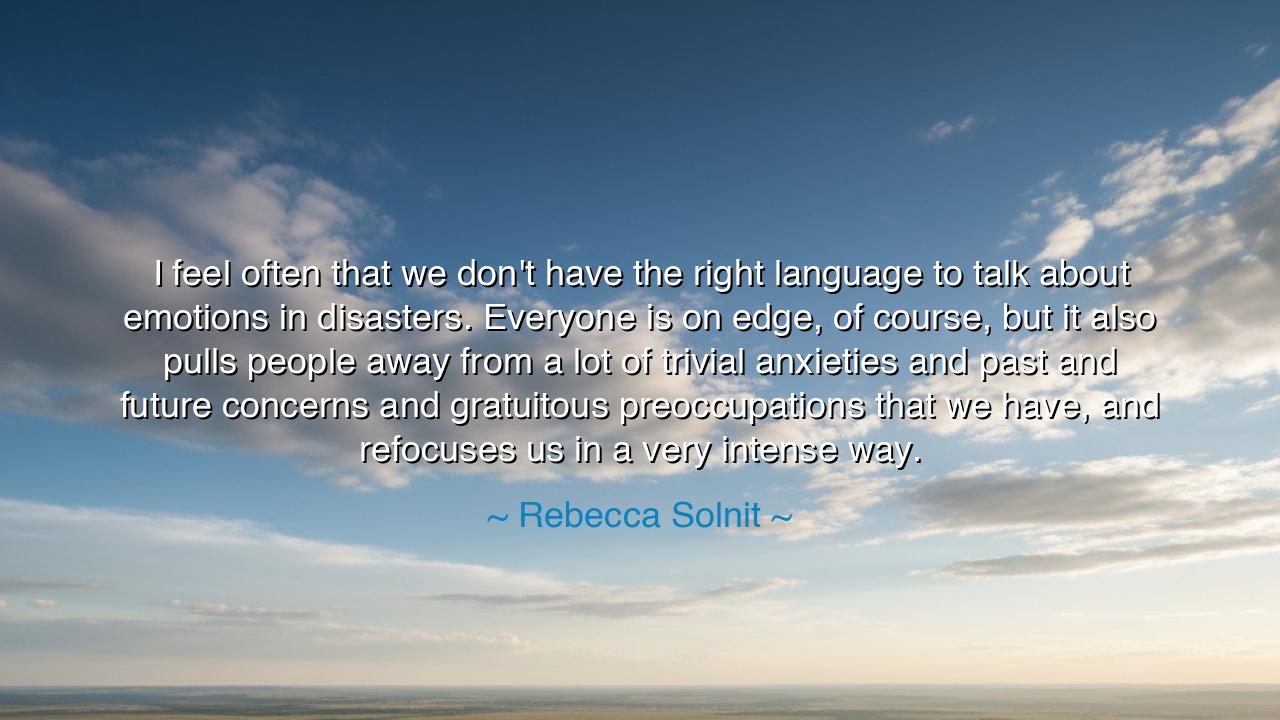
I feel often that we don't have the right language to talk about
I feel often that we don't have the right language to talk about emotions in disasters. Everyone is on edge, of course, but it also pulls people away from a lot of trivial anxieties and past and future concerns and gratuitous preoccupations that we have, and refocuses us in a very intense way.






In the profound currents of human existence, there are moments that disrupt the ordinary, stripping away the veneer of daily life and bringing to the forefront the raw, unfiltered emotions of the soul. Rebecca Solnit’s words, “I feel often that we don't have the right language to talk about emotions in disasters. Everyone is on edge, of course, but it also pulls people away from a lot of trivial anxieties and past and future concerns and gratuitous preoccupations that we have, and refocuses us in a very intense way,” speak to this deep truth. She reflects on the nature of disasters—those life-altering events that, while shattering, offer us a profound opportunity to confront our humanity and the deeper truths about our lives.
Solnit’s observation carries with it the realization that in times of crisis, the typical language of human experience seems insufficient. There are no words that fully encompass the chaos, the fear, or the intensity that one feels when a disaster strikes. It is as though the very foundation of language, which is built to express our everyday thoughts and concerns, falters when faced with the enormity of life’s most profound moments. These are the moments that force us to look beyond the superficial, to confront the fragility of life, and to come to terms with what truly matters. Yet, in this vulnerability, we discover an unexpected gift—the clarity of purpose and the removal of trivial anxieties that so often preoccupy our minds.
This phenomenon is echoed in the wisdom of the ancient philosophers, who understood that disaster has a unique way of distilling life to its most essential elements. The Stoics, for example, believed that it is through hardship and suffering that we learn to focus on what is truly important. Epictetus taught that it is not external events that disturb us, but our reactions to them. In the face of disaster, when everything else falls away, we are left with the essence of our being—our resilience, our compassion, and our capacity to endure. Solnit’s insight resonates with this Stoic truth: in the midst of chaos, we are refocused, unburdened from the distractions of triviality, and reminded of the strength and clarity that reside within us.
The same idea is found in the stories of those who have faced great tragedy or calamity throughout history. Consider the victims of war or those who have survived natural disasters. In the aftermath, the immediate survival instinct often brings people together in profound ways, cutting through the divisions that normally separate them. Take, for instance, the survivors of World War II. Amid the devastation of war, with cities reduced to rubble and countless lives lost, individuals were often stripped of their previous concerns and faced with a new reality. They did not have the luxury of worrying about the trivialities of daily life. Instead, they were forced to confront the immediacy of survival, the deep connections they shared with one another, and the fragility of life itself. In these moments of shared suffering, the true human spirit emerges—undistracted, focused, and collective.
Solnit’s reflection on disasters also speaks to the catharsis that they bring. When all the distractions of modern life are stripped away, we are left with a singular focus: our emotions, our human connection, and the shared experience of surviving together. It is in these moments that the language of the heart takes over, a language that transcends words, a language built on compassion, solidarity, and presence. The trivial concerns of the past and future dissolve, and we are left with a raw, unspoken bond between us and those around us.
But the lesson here is not just about the cleansing effect of disaster—it is also about mindfulness and awareness in our everyday lives. While we cannot always control the chaos that life throws our way, we can learn from these moments of clarity and apply them to our daily routines. Solnit's words urge us to recognize the distractions that fill our lives—those gratuitous preoccupations that keep us from focusing on what truly matters. We are encouraged to reflect on our own lives, to refocus on our relationships, our values, and our purpose. By doing so, we can cultivate a life that is not waiting for disaster to teach us lessons, but one that is mindfully aware of the preciousness of the moment.
And so, the lesson we must carry forward is this: the next time we are faced with chaos, whether it be a disaster or a more personal upheaval, we should allow ourselves to be refocused. We must learn to embrace the simplicity and clarity that come when life’s distractions fall away. In moments of difficulty, we should seek not only to survive but to embrace the deeper connections and truths that arise from such experiences. Let us carry this lesson with us in our daily lives—living with awareness, purpose, and a deep appreciation for the present moment, knowing that each day is a chance to refocus on what truly matters.






AAdministratorAdministrator
Welcome, honored guests. Please leave a comment, we will respond soon